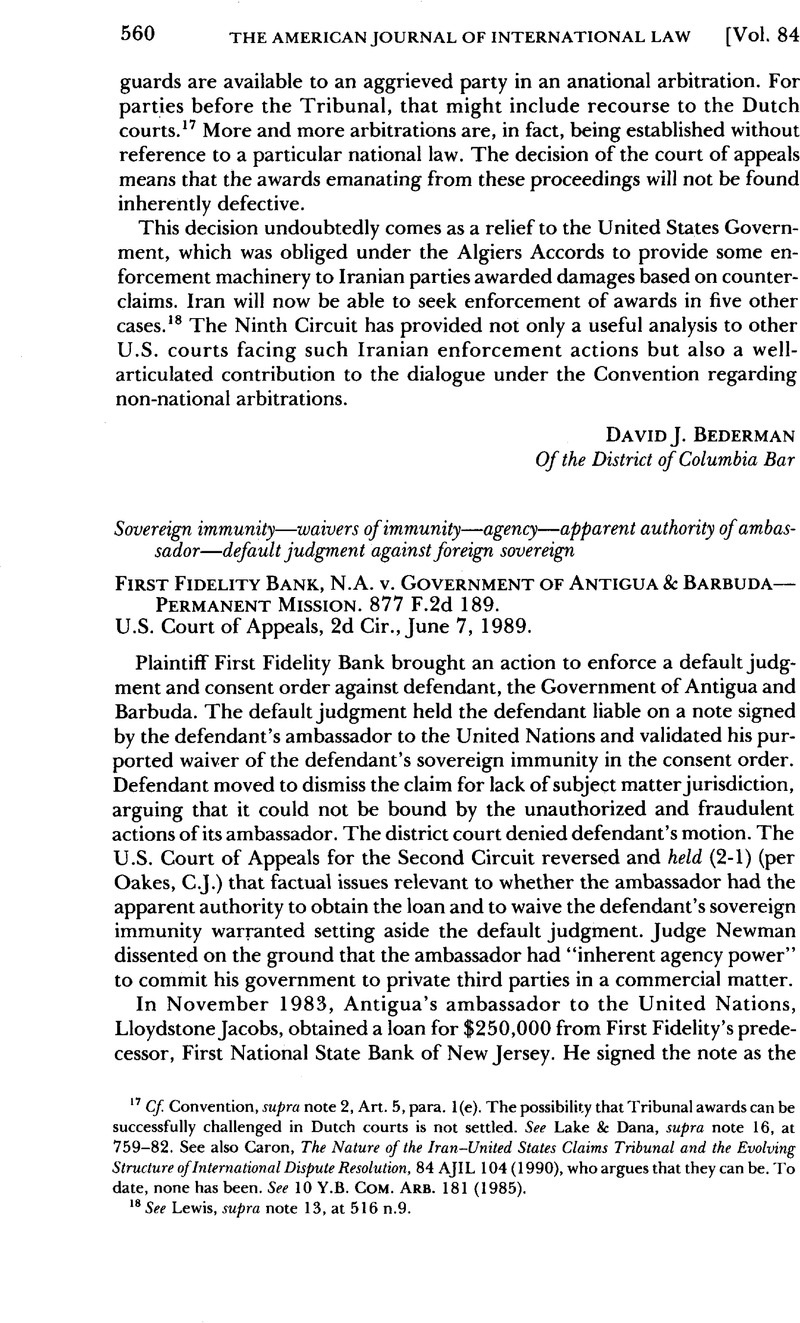No CrossRef data available.
Article contents
Sovereign immunity—waivers of immunity—agency—apparent authority of ambassador—default judgment against foreign sovereign
Published online by Cambridge University Press: 27 February 2017
Abstract

- Type
- International Decisions
- Information
- Copyright
- Copyright © American Society of International Law 1990
References
1 877 F.2d 189, 192–93. Sec. 331(1) of the Restatement provides that a state’s consent to an international agreement is invalid if the fraudulent conduct of another negotiating state or the corruption of the state’s own representative by another negotiating state induced its consent. Sec. 331(2) provides that such an agreement is void if the state’s consent was procured by the coercion of the state’s representative. Restatement (Third) of the Foreign Relations Law of the United States §331(1) and (2) (1987) [hereinafter Restatement (Third)].
2 877 F.2d at 192–93 (emphasis by court).
3 Id at 193 (citing Restatement (Third), supra note 1, §311 Reporters’ Note 4 (noting that the provision concerning apparent authority to conclude international agreements is analogous to national laws on the authority of agents)).
4 Restatement (Second) of Agency §27 and comment a, §49 comment c (1958).
5 877 F.2d at 194 (quoting General Overseas Films, Ltd. v. Robin Int’l, Inc., 542 F. Supp. 684, 689 (S.D.N.Y. 1982), aff’d, 718 F.2d 1085 (2d Cir. 1983)). The court also cited §456 comment b of the Restatement (Third), supra note 1, which states that a party relying on a waiver of sovereign immunity has the burden of showing that the person executing the waiver had the authority to bind the state.
6 28 U.S.C. §§ 1603(d), 1605(a)(2) (1982) (denning commercial activity exception).
7 28 U.S.C. §1330(1982).
8 461 U.S. 480, 493 & n.20 (1983).
9 665 F. Supp. 323, 332–33 (S.D.N.Y. 1987), aff’d per curiam, 841 F.2d 26 (2d Cir.), cert, denied, 108 S. Ct. 2874 (1988).
10 877 F.2dat 197.
11 In addition to actual and apparent authority, the Restatement (Second) of Agency also describes something called “inherent agency power,” a type of power derived not from actual authority, apparent authority or estoppel, but from the agency relation itself, which exists to protect persons harmed by, or dealing with, an agent. Restatement (Second) of Agency, supra note 4, §8A. This is the source from which Judge Newman derived his federal common law rule. He admitted, however, that the government–ambassador relationship did not fall neatly within the examples of inherent agency power set forth in comment b to that section.
12 877 F.2d at 199.
13 See Morgan Guaranty Trust Co. of N.Y. v. Republic of Palau, 657 F. Supp. 1475 (S.D.N.Y. 1987) (denying Government’s motion for summary judgment made on the ground that the President of Palau’s signature on a loan agreement was ultra vires); Liu v. Republic of China, 892 F.2d 1419 (9th Cir. 1989) (allegations by widow that Republic of China actually authorized murder of her husband and that his assassins were agents of China acting within the scope of their authority were sufficient to avoid dismissal of her suit under the FSIA); Skeen v. Federative Republic of Brazil, 566 F. Supp. 1414 (D.D.C. 1983) (claim arising out of tortious assault of plaintiff by grandson of Brazilian ambassador who was also an employee of the Brazilian Government).




